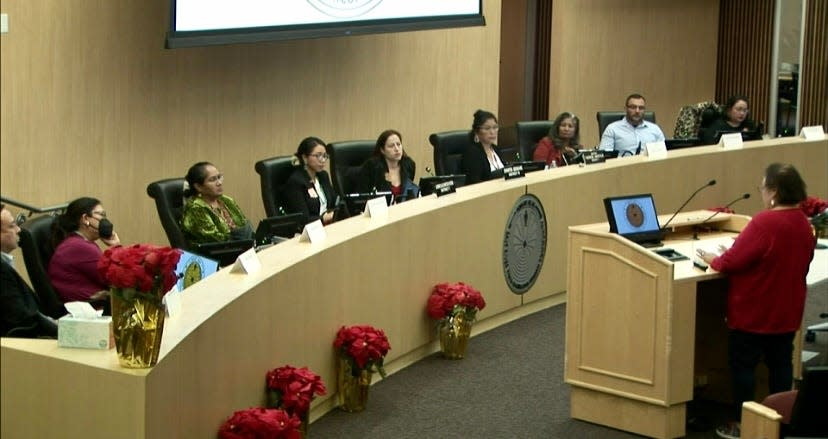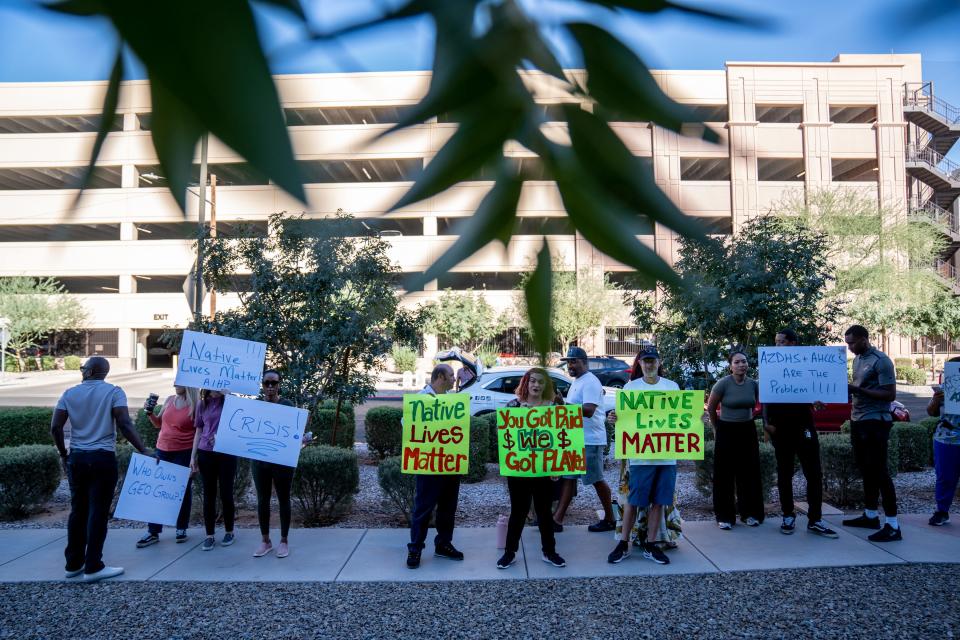Families, friends of people hurt by fake rehab centers will march to raise awareness
Shawn Bedonie had only been at a sober living home in south Phoenix for three months when he was found dead in his room on June 3.
When Bedonie's mother, Patricia Bedonie, and his sister, Melissa Joseph, tried to collect his belongings at the facility on South 44th Street, they discovered that items had already been stolen by other residents in the house. Joseph saw beer cans scattered around and alleged that the behavioral health technician living with the clients had been engaging in drug use with the people seeking treatment.
“That was no sober living house when my mom and I went there to go pick up his belongings,” Joseph told The Arizona Republic. She had undergone treatment at a legitimate facility, Bethel Behavioral Care in Maricopa, and had been sober for more than 13 months, and said she was aware of how an appropriate sober living facility is supposed to run.
“He died inside his own room inside the sober living house,” she said “There was beer everywhere. They stole his wallet, took his phone and they started stealing stuff from him after he passed away that same night.”
Patricia Bedonie received the shocking news of her 40-year-old son’s death from her brother, who was listed as Shawn Bedonie’s emergency contact. She had visited her son often but was never allowed to go inside the facility. She said when she tried to visit, her son would be notified and instructed to meet with her outside, which seemed peculiar to her and Joseph.
“When I got there I can't even go to the door,” said Patricia Bedonie. “They always tell me that ‘you can wait out there.’ So I ended up just waiting outside and just really did not get a chance to meet anybody or whoever were all staying there. I never got to meet anybody.”
Marching to raise awareness of the issue
On Friday, starting at 10 a.m., advocates trying to raise awareness of the fraudulent rehab centers will stage a march, starting at Steele Indian Park, 300 E. Indian School Road, one of the first such events since news of the centers broke last year.
The Republic first reported in December that fraudulent sober homes were targeting Indigenous communities. In May, as the story spread, Gov. Katie Hobbs and Attorney General Kris Mayes announced that they were investigating the centers, which had cost the state hundreds of millions of dollars in reimbursements. Standing alongside tribal leaders, they promised to go after the people behind the fraud.
Amid the investigation, the state suspended as many as 375 sober living homes. Meanwhile, the Navajo Nation set up a high-profile operation known as Operation Rainbow Bridge, intended to help get displaced people home. Advocates had been taking on the task themselves for months before they finally were able to get the attention of tribal and state leaders.

In early November, Mayes announced the indictment of 41-year-old Corey Beckhum for conspiracy and unlawful consideration for the referral of patients.
Reva Stewart was among the initial advocates turning the spotlight on the issue, but despite efforts by state and tribal officials, she and others say the progress is insufficient.
They argue that deaths similar to Bedonie's continue to occur frequently without proper attention, and they believe state and tribal leaders seem more concerned with fraud than holding anyone accountable for the lives lost.
“It's frustrating. So I'm very, very angry because nobody wants to take that accountability,” said Stewart. “I do ask who is being held accountable for the deaths? ‘Well, we're just working on the fraud part,’ is what is said. ‘We're investigating the money.’”
Nearly a year after Stewart and others first testified about the rehab centers, they continue to help victims who were recruited, taken in and scammed by the fraudulent centers. They continue to get them back home using money from a GoFundMe they started, and try to bring awareness to the deaths that continue inside the still-operating homes. They say nothing has improved.
“Our awareness now, as you know, we want to raise awareness for the displacement of our homeless relatives from the fraudulent, sober living homes,” said Stewart. “And to raise awareness on the deaths of so many more that have died in these homes even last week. It's just unbelievable that people are still being recruited.”
Stewart said there are more unsheltered people now than ever. She counts at least 300 deaths based on obituaries and the people she speaks with, but she believes there are many more.
The Navajo Nation's Operation Rainbow Bridge has produced lackluster results, Stewart said. She had reached out to President Buu Nygren and first lady Jasmine Nygren, who is a member of Hobbs’ Missing and Murdered Indigenous People task force, and nothing has been done to make a real difference.

Gov. Katie Hobbs formed her Missing Murdered Indigenous People Task Force, similar to one created by New Mexico Gov. Michelle Lujan Grisham.
“We want accountability,” said Stewart. “I said there's too many people dying, do people care? I reached out to the president (Nygren). I remember speaking to his wife at the first few ad hoc meetings. Nothing. Nobody. None of the tribes, the only people that communicate with me are advocates in their tribes.”
Operation Rainbow Bridge is transporting people home just one day out of the week, Stewart said. For her and other advocates, it's never-ending. She said they have helped over 450 people get home, some all the way to Montana, Nebraska, North Dakota, South Dakota, Michigan, Alaska, Utah and one to Georgia.
The more than $9,000 raised on the group's GoFundMe has mostly been spent to help people get home.
“They pick and choose what days they want to do transportation,” said a frustrated Stewart about Operation Rainbow Bridge. “They only do it on Friday now at the Community Intake Center. So I said, 'What happens when there's a whole bunch of people that want to go home?'"
The Republic attempted to get information or an update on Operation Rainbow Bridge from the Navajo Nation’s Attorney General's Office, but got no response.
Stewart is more than frustrated with the lack of accountability by state and tribal leaders, but she said it doesn’t take away from the work she and her group are doing. She said she would be happy if even 20 people showed up for their march Friday. She had sent invitations to tribal leaders on the Navajo Nation but hasn’t received a response.
“It's just an awareness walk because we want people to know that we are still here,” said Stewart. “We still care. We want people to be aware that this is still going on. That people are still missing or still dying."
Trying to get sober to find a job
Shawn Bedonie was a silversmith like his mom but was trying to find a job, which is why he wanted to get sober. Joseph said her brother was a loving father to his children and a good man all around.
“I did not know what the situation he was in,” said Patricia Bedonie of the rehab home. “If I knew all the stuff that was going on, I would have pulled him back out. I did not know.”
She mentioned her son had been in rehab facilities in the past, but financial constraints led him to seek another option. Unlike many others who were recruited and brought to such facilities, Shawn Bedonie discovered this place through word of mouth. He heard about a location "where all the Native Americans stay at," his family said, and understood that Arizona Health Care Cost Containment System would be able to cover the costs.
Upon receiving more details about her son's passing, Patricia Bedonie learned that during breakfast one day, people from the facility went to Shawn Bedonie's room to check on him. At that time, he assured them he was fine and preferred not to be disturbed. At lunchtime when they revisited his room, they noticed he wasn't responsive or moving.
“They told me that they were trying to revive him,” said Patricia Bedonie. “It didn't work so they just ended up calling the police.”
The Republic contacted the Phoenix Police Department and the South Mountain Precinct to request the police report, but the request so far remains unfulfilled. Questions were also submitted to detectives, but no answers have been provided yet.
'This is not a place for my brother to be in the first place'
Joseph admitted she had her own drug and substance abuse problem, and because of that she knew the area where her brother was staying wasn’t safe. As she drove her mom to get her brother’s belongings she said she knew exactly where the dope houses were.
“The (technician) and one of the clients were walking away from the dope house too,” said Joseph. “So obviously they bought some drugs and they were walking back, and I guess a guy recognized my mom's vehicle so they started walking back to the house really quick.”
After being told to wait a few minutes outside, Patricia Bedonie was finally able to go inside the facility for the very first time to retrieve Shawn Bedonie’s belongings, and straight away, Joseph knew the home was a front for something other than sobriety.
“I'm like, this is really weird because the sober living house I came to they invite you in,” said Joseph. “They tell you about the whole program, and they have licenses on the walls, they tell you how AHCCCS actually works and they have all these emergency numbers and everything else. I saw the walls and it had no certificates or anything like that. This was not a sober living house. It just looked like a flop house, really bad.”
She mentioned there was no easily accessible breathalyzer at the entrance for staff to use on clients returning intoxicated. When she inquired about it, the behavioral health technician took a long time to locate the device, and it appeared to be new and unused.
Joseph said the air conditioner was not functioning, kitchen appliances were taped up and non-operational, her brother's bed consisted of a box spring on milk crates, and she noticed the main bedroom, which had a proper bed, had a nearby tripod suggesting the possible presence of a camera.
“I was like, ‘if this is a sober living house. Why is there a 12-pack of beer in my brother's room?’ said Joseph. "And I asked ‘why does the guy next door have my brother's stuff? You guys started stealing from my brother after he passed away? This stuff is not yours!'"
Joseph recalls hearing horror stories about the fake centers from clients she would meet at the facility she was at, stories about drug and alcohol use, sexual assault and sex trafficking. During her time at Bethel Behavioral Care, Joseph said she got her certification for peer support, and is working on getting her management license so she can help people.
In the five months since Shawn Bedonie’s passing, Joseph said they have not received a phone call from the owner of the center or anyone else.
“He was a great guy," Joseph said. "When he saw someone down, he’d help bring them back up like he's always laughing, always supportive. He's a great dad, like he always supported his kids.”
Arlyssa Becenti covers Indigenous affairs for The Arizona Republic and azcentral. Send ideas and tips to arlyssa.becenti@arizonarepublic.com.
Support local journalism. Subscribe to azcentral.com today.
This article originally appeared on Arizona Republic: March will raise awareness of fraudulent drug rehab centers

